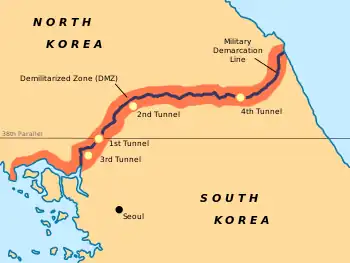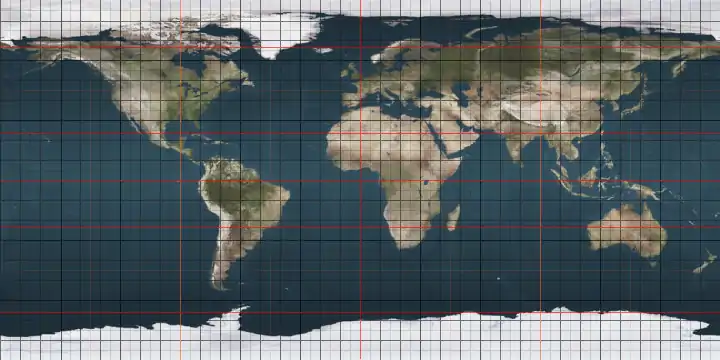38th parallel north
The 38th parallel north is a circle of latitude that is 38 degrees north of the Earth's equatorial plane. It crosses Europe, the Mediterranean Sea, Asia, the Pacific Ocean, North America, and the Atlantic Ocean. The 38th parallel north formed the border between North and South Korea prior to the Korean War.
.svg.png.webp)
| 38th parallel north | |
| Hangul | 삼팔선 |
|---|---|
| Hanja | 三八線 |
| Revised Romanization | Sampalseon |
| McCune–Reischauer | Samp'alsŏn |
At this latitude, the Sun is visible for 14 hours, 48 minutes during the summer solstice and 9 hours, 32 minutes during the winter solstice.[1]
Around the world
Starting at the Prime Meridian heading eastward, the 38th parallel north passes through:
Korea


Japan had ruled the Korean peninsula between 1910 and 1945. When Japan surrendered in August 1945, the 38th parallel was established as the boundary between Soviet and American occupation zones. This parallel divided the Korean peninsula roughly in the middle. In 1948, this parallel became the boundary between the Democratic People's Republic of Korea (North Korea) and the Republic of Korea (South Korea), both of which claim to be the government of the whole of Korea. On 25 June 1950, after a series of cross-border raids and gunfire from both the Northern and the Southern sides, the North Korean Army crossed the 38th parallel and invaded South Korea. This sparked the United Nations Security Council Resolution 82 which called for the North to return its troops to behind the 38th parallel and condemned the Korean War, with United Nations troops (mostly American) helping South Korean troops to defend South Korea.[2]
After the Armistice agreement was signed on July 27, 1953, a new line was established to separate North Korea and South Korea. This Military Demarcation Line is surrounded by a Demilitarized Zone. The demarcation line crosses the 38th parallel, from the southwest to the northeast. The Demarcation Line is often confused with 38th parallel, but as can be seen in the image of the map, the two are not the same.
See also
- 37th parallel north
- 38th parallel structures, series of circular depressions roughly on the 38th parallel north
- 39th parallel north
- Circle of latitude
References
- "Duration of Daylight/Darkness Table for One Year". aa.usno.navy.mil. Archived from the original on 2019-10-12. Retrieved 2011-06-12.
- Nash, Gary B., The American People (6th edition), Pearson Longman (New York), 2008.
Further reading
- Oberdorfer, Don. The Two Koreas: A Contemporary History. (1997)
- 38th parallel (geopolitics) at the Encyclopædia Britannica
